最新高中英语教案范例
高中英语教案模板(通用8篇)
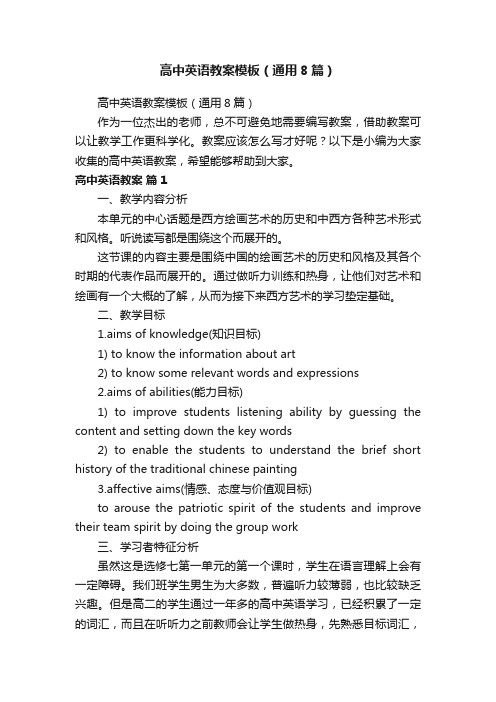
高中英语教案模板(通用8篇)高中英语教案模板(通用8篇)作为一位杰出的老师,总不可避免地需要编写教案,借助教案可以让教学工作更科学化。
教案应该怎么写才好呢?以下是小编为大家收集的高中英语教案,希望能够帮助到大家。
高中英语教案篇1一、教学内容分析本单元的中心话题是西方绘画艺术的历史和中西方各种艺术形式和风格。
听说读写都是围绕这个而展开的。
这节课的内容主要是围绕中国的绘画艺术的历史和风格及其各个时期的代表作品而展开的。
通过做听力训练和热身,让他们对艺术和绘画有一个大概的了解,从而为接下来西方艺术的学习垫定基础。
二、教学目标1.aims of knowledge(知识目标)1) to know the information about art2) to know some relevant words and expressions2.aims of abilities(能力目标)1) to improve students listening ability by guessing the content and setting down the key words2) to enable the students to understand the brief short history of the traditional chinese painting3.affective aims(情感、态度与价值观目标)to arouse the patriotic spirit of the students and improve their team spirit by doing the group work三、学习者特征分析虽然这是选修七第一单元的第一个课时,学生在语言理解上会有一定障碍。
我们班学生男生为大多数,普遍听力较薄弱,也比较缺乏兴趣。
但是高二的学生通过一年多的高中英语学习,已经积累了一定的词汇,而且在听听力之前教师会让学生做热身,先熟悉目标词汇,使听力难度降低。
高中教案英语(精选6篇)

高中教案英语(精选6篇)高中教案英语篇1Disneyland教学目标本单元对话课复习了有关问路及应答用语,要求学生用所学语言自编对话描述所在学校、区域或城市;本单元介绍了美国的迪斯尼乐园及其创始人Walt Disney艰苦创业的生活经历。
通过本单元教学,要求学生掌握迪斯尼乐园的概况,并可根据提示复述沃尔特?迪斯尼奋斗的生活简历。
引导学生意识到只有通过自身的努力,艰苦奋斗,才能收获成功的道理。
同时,设计问答练习,提高学生阅读能力。
作为高二的起始单元,此处复习了宾语从句的用法,通过课文阅读,完成练习册后练习,学生需熟练掌握此语言项目,并准确运用到口头及书面表达中。
对话教学建议Step 1听录音教师放对话录音,放完两遍之后,教师根据对话内容提出一些问题。
1.What were they talking about ?2.How to answer the first /second/third/forth/fifth visitor question?Step 2 练习组织学生五个人一组,练习对话三至五分钟。
教师请几组同学到前面表演。
Step 3改写将对话内容改写为一篇短文,要求学生用本课的地点名称如:Sleeping Beauty Castle , Bear Country, Horse-drawn streetcars, the Tomorrow Land Building比如:Carl is answering visitors’ questions. The first visitor asks Carl the way to the Sleeping Beauty Castle….Step 4 讨论If you are visitor, How to ask the way to the stranger at first?Step 5总结教师提问学生们,归纳和总结对话用语。
Asking:Where is …...How can I get to…Which is the way to…Could you tell me if…Could you tell me the way to…Answering:Go straight ahead…It’s behind …/in frond of/Go down this street…教材分析本课的日常用语用语是有关对话asking the way and responses,这样的问路用语在初中都以学过,所以对话不在是个难点。
高中英语教案模板四篇
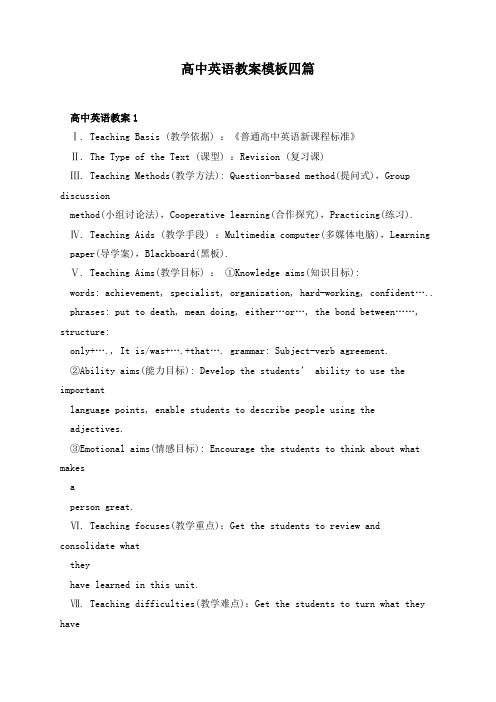
高中英语教案模板四篇高中英语教案1Ⅰ. Teaching Basis (教学依据) :《普通高中英语新课程标准》Ⅱ. The Type of the Text (课型) :Revision (复习课)Ⅲ. Teaching Methods(教学方法): Question-based method(提问式),Group discussionmethod(小组讨论法),Cooperative learning(合作探究),Practicing(练习). Ⅳ. Teaching Aids (教学手段) :Multimedia computer(多媒体电脑),Learning paper(导学案),Blackboard(黑板).Ⅴ. Teaching Aims(教学目标) :①Knowledge aims(知识目标):words: achievement, specialist, organization, hard-working, confident….. phrases: put to death, mean doing, ei ther…or…, the bond between……, structure:only+…., It is/was+….+that…. grammar: Subject-verb agreement.②Ability aims(能力目标): Develop the students’ ability to use the importantlanguage points, enable students to describe people using theadjectives.③Emotional aims(情感目标): Encourage the students to think about what makesaperson great.Ⅵ. Teaching focuses(教学重点):Get the students to review and consolidate whattheyhave learned in this unit.Ⅶ. Teaching difficulties(教学难点):Get the students to turn what they havelearned intotheir ability.Ⅷ.Teaching procedure(教学过程): Step 1 复习学案情况反馈(1分钟)Step 2 lead-in :通过图片展示的方式,过渡到知识竞答类节目《一站到底》,本节课也将模仿这种模式授课。
高中英语教案英文版5篇

高中英语教案英文版5篇高中英语教案英文版5篇教案可以恰当地选择和运用教学方法,调动学生学习的积极性,面向大多数学生,同时注意培养优秀生和提高后进生,使全体学生都得到发展。
以下是带来的内容,感谢您的阅读,希望能帮助到您!高中英语教案英文版1Teaching Procedures of Period 1:Step1.Warming up (15 mins)Ss know a lot about sports from everyday life and media, so I arrange sucha task -discussion(group of 4): Q: What do you know about sports?During this process, if Ss can’t express themselves in English, Chinese isalso all right. Besides, it is agood chance to present new words. If necessary, I will make somecomplements. At the same time, I will present them as many pictures about sportsas possible.Possible response:school sports meetSports meet the National Gamesthe Asian Gamesthe Olympic Gamesthe World Cupetcball games: volleyball, basket ball, football, table tennis, tennis,,golfbadminton, bowling, baseball, American football, ice hockey etcEvents of sports track and field: relay race, long jump, high jump, polejump, discus, shot, javelin etcgymnastic: rings, double bars, high and low bars, horse , free exerciseswimming/shooting/skiing/ ice sports/diving/aquatic sports etcSport stars : Beckham, Mike Owen, Michael Jordan etc Purpose: This activity is designed to encourage students to think aboutsports and activaterelevant vocabulary.Step 2. Speaking(15 mins)Task1(pair work): Talk about their favourite sports, favourite sportsstars, and the reason why they like them, with the following expressions as aguide.(See SB p52) Task2(pair work): A survey about physical fitness (Seepostscript 1)Task3(group work): Add up their total scores and divide by the number ofpeople. Then get their group’s average scores. Discuss their survey answers.1). Do you think your group is doing well or not? Why ?2). How can you become fitter?高中英语教案英文版2教学目标Teaching aims and demands本单元的教学目标是使学生掌握表示判断和个人看法的常用语句,学会使用现在完成时的被动语态。
高中英语优秀教案范例四篇

高中英语优秀教案范例四篇英语文化教学是现代教学中非常重要的一门课程,已经成为一种主流的课程,各个阶段对英语文化教育的课程都是非常重视的, 理解英语母体本身的真正含义,真正的将英语这门语言学好,达到综合运用的能力。
高中英语教案1I.MeetingyournewSs- Getting to know your Ss introducing yourself to the Ss- Setting up necessary rules for classroom learning and for homeworkII.Topics- Friends and friendship- Interpersonal relationshipsIII.Function- AgreementI agree. Yes, I think so. So do I. Me too. Exactly.No problem. Sure.Certainly. Of course. All right.You’re right/correct. Good idea.I think that’s a good idea.- DisagreementI don’t think so. Neither do I. That’s not right.Yes, but …I’m afraid not. No way.I’m sorry, but I don’t agree.Of course not. I disagree.IV.Grammar- Direct Speech and Indirect Speech (Part I. Statements and questions)1. Reporting statements“I don’t want to set down a series of facts in a diary,” said Anne.---- Anne said that she didn’t want to set down a series of facts in a diary.2. Reporting yes-no questions“Does a friend always have to be a person?” the writer asks us.---- The writer asks us if a friend always has to be a person.3. Reporting wh- questions“What do you call your diary?” Anne’s sister asked her.---- Anne’s sister asked her what she called her diary.V.Wordsandexpressionsupset ignore calm concern loose Netherlands German series outdoors dusk thunder entire entirely power curtain dusty partner settle suffer highway recover pack suitcase overcoat teenager exactly disagree grateful dislike tip swap item (32 words) add up calm down have got to be concerned aboutwalk the dog go through set down a series ofon purpose in order to at dusk face to faceno longer suffer fromget/be tired ofpack sth. upget along with fall in love join in(19 phrases)- survey vet Amsterdam Jewish Nazi Kitty spellbind loneliness Margot gossip secondly (11 words)VI.Timeallotment1st period – Warming up (P1) Workbook Listening (P41)2nd period –Pre-reading Reading Comprehension (P2-P3)3rd 4th period –Learning about Language (P4-5)5th period –Using Language (P6 Reading listening)6th period–Using Language (P7 Reading Writing)7th period–Wb Listening Task Reading Task (P43-44)8th period–Writing Task Project (P46-47)The 1st period – Warming up Using languageGoals for the 1st period:1. Introduce yourself and set up some rules for learning2. Talk about friends and friendship3. Learn the new words and expressions:upset ignore calm concern loose add up calm down have got to be concerned about walk the dogTeaching procedures:Step1Beginning1. Introduce yourself2. Set up some rules for learning:Before class: 1) Get into the classroom at the first bell.2) Get everything and yourself ready for the class.In class: 1) Follow the teacher closely and work with your mind.2) Take an active part in classroom learning activities.3) Take notes and raise questions.4) Speak English as much as you can.After class: 1) Finish your homework on time and hand it in as required.2) Review what you’ve learned in class in time.3) Preview your lesson as required.Step2Warmingup1. Introduce the topic Friendship. Ask Ss if they have a very good friend and why he or she can be their good friends.(Collect the adjectives/nouns Ss use to describe their friends on the Bb.)Supplements:Poem 1 Friends Poem 2 Auld Lang SyneBy Jill EgglestonBy Robert BurnsFriends care Should auld acquaintance be forgotFriends share and never brought to mind?We need friends Should auld acquaintance be forgotEverywhere!and days of auld lang syne?For auld lang syne, my dear,Proverbs: for auld lang syne,A life without a friend is a life withoutwe’ll take a cup of kindness yes,a sun. --- French proverbfor auld lang syne.You can buy friendship with friendship,but never with dollars.Should auld acquaintance be forgot --- Unknown and never brought to mind?A friend is a person with whom I may be Should auld acquaintance be forgotsincere. With him, I may think aloud. and days of auld lang syne?--- Ralph Waldo Emerson And here’s a hand, my trusty friendReal friendship is shown in times of trouble; And gie’s (give us) a hand o’thineProsperity is full of friends. We’ll tak’ a cup o’kindness yet---EuripidesFor auld lang syne.2. Think: What qualities and behaviors make a good friend?(a. Let the Ss make a list of 3-5 qualities a good friend should have.b. Have them work in group of four to collect the list of words.c. Then ask one from each group to write the words on the Bb.)3. Have the Ss do the survey in the Sb P1.4. When they have completed it, have Ss look again at the list on the Bb to see whether it should be revised.Explanation of each item:Q1: A: 1 point B. 3 points C. 2 pointsThis question deals with how thoughtful you are towards others: How much do you value your friend? Would you change the time of the day to go to the cinema to fit in with him/her?Q2: A: 1 point B. 2 points C. 3 pointsThis question is concerned with fairness: Is it fair for your friend to borrow something, break it and return it broken?Q3: A: 1 point B. 2 points C. 3 pointsThis question deals with your concern for others: Should you make the troubles of your friend more important than your own responsibilities?Q4: A: 3 point B. 2 points C. 1 pointsThis question is concerned with responsibilities to a friend. If you are asked to look after something and it is broken or harmed, what should you do?Q5: A: 0 point B. 2 points C. 0 pointsThis question is concerned with honesty.5. Quickly deal with the meaning of the new expressions in this part. We’ll later practice them in Ex 1, 2, 3 in Learning about language on Sb P.41) add up: v. to add sth. together2) upset: adj. sad, unhappy3) ignore: v. pay no attention to4) calm…down: v. make sb. calm, comfort sb.5) have got to …: v. have to do sth.6) be concerned about: v. be worried about, care about7) walk the dog: v. exercise the dog8) loose: adj. not tight重点词汇用法的学习,例如:1. add: add ... to;add to; add up; add up to;Eg. Will you please add some milk to my coffee?The little baby adds to our enjoyment at the party.Add up your score and see how many points you get.Add up these figures foe me, please.All the money I have in my pocket adds up to $ 125.2. upset: adj. worried, annoyed; v. cause to worry, to be sad/angryEg. I was very upset because one of my friends was rude to me.His cheating in the exam upset his teacher.3. ignore: v. pay no attention to; to behave as if you had not heard or seen sb./sth. n. ignoranceEg. You can’t ignore the fact that many criminals never go to prison.These are the problems which we can’t afford to ignore.Sam rudely ignored the inquiry.He had completely ignored her remark, preferring his own theory.4. calm: v. calm downEg. The mother calmed the baby by giving him some milk.What the manager said calmed the fears of the works.We tried to calm him down, but he kept shouting and crying.Calm down. There’s nothing to worry about.5. concern: v. concern sth.; be concerned about /with/ for sb. / sth.; n.Eg. This case concerns the group of people greatly.What I said at the meeting doesn’t concern you, so don’t worry about it.Our head teacher is concerned about our study and health all the time.He has never been concerned about/for what others think of him.He seemed to be concerned with the case.Your school work, rather than your private life, is my concern.My greatest concern is the development of our school.6. walk the dog: to take a dog for a walkEg. He is out walking the dog.walk sb home/ to a placeIt’s late --- let me walk you to the bus stop.6. If necessary, the T may ask one or two Ss the following questions:a. What kind of person are you according to the survey?b. Do you think you can be a good friend to others? And how?c. What do you think are the basic elements we need to keep our friendship?Step3ListeningWorkbook Listening on P411. Before you listen, discuss these questions with the class.1) Do you think it is a good idea to make friends with people from other countries?(to broaden one’s world outlook; to avoid national stereotypes etc.)2) What are the advantages of this friendship?(to practice another language with a native speaker; to learn new ideas and new ways of thinking; to find out more about another country etc.)2. the 1st Listening of Part 1: Write down what Leslie does in China in one sentence.(Leslie does some business in China and her company sells buses.)3. the 2nd Listening of Part 1: Tick the things done by Leslie.(going out for delicious dinners; visiting a mountain; going to people’s homes)4. the 1st Listening of Part 2: What does Leslie say about the friends she made in China?(1) Leslie says that she make friends but they are just business friends because she thinks one cannot make friends on a short visit.(2) Leslie thinks some of the friends in China may have liked her, but others may try to be nice to her so as to gain a business advantage.Step4Homework1. Make sentences with the 8 new words and expressions.2. Prepare and read aloud the rest new words.The 2nd period – Pre-reading Reading ComprehensionGoals for the 2nd period:1. Have Ss read the text and try their best to understand Anne’s eagerness for friends, friendship, nature and freedom.2. Get Ss have some knowledge about the Nazi’s cruel deeds towards the Jews during the Second World War.3. Train Ss’ reading ability of scanning and skimming. Learn to appreciate Anne’s Diary , the classic work.高中英语教案2课题:Friendship\(2)教材分析与学生分析:本单元的中心话题是“友谊”,几乎所有的内容都是围绕这一中心话题展开的。
高中英语优秀教学案例六篇
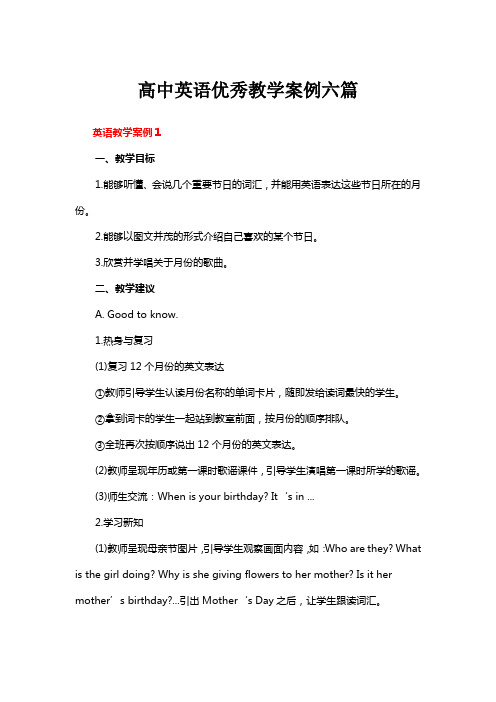
高中英语优秀教学案例六篇英语教学案例1一、教学目标1.能够听懂、会说几个重要节日的词汇,并能用英语表达这些节日所在的月份。
2.能够以图文并茂的形式介绍自己喜欢的某个节日。
3.欣赏并学唱关于月份的歌曲。
二、教学建议A. Good to know.1.热身与复习(1)复习12个月份的英文表达①教师引导学生认读月份名称的单词卡片,随即发给读词最快的学生。
②拿到词卡的学生一起站到教室前面,按月份的顺序排队。
③全班再次按顺序说出12个月份的英文表达。
(2)教师呈现年历或第一课时歌谣课件,引导学生演唱第一课时所学的歌谣。
(3)师生交流:When is your birthday? It‘s in ...2.学习新知(1)教师呈现母亲节图片,引导学生观察画面内容,如:Who are they? What is the girl doing? Why is she giving flowers to her mother? Is it her mother’s birthday?...引出Mother‘s Day之后,让学生跟读词汇。
英语教学案例2一、语言技能目标第一层次:1.能够听懂、会说衣服词汇cap,coat,shoes,sweater,jacket,gloves,trousers;能在四线三格中基本规范地抄写单词,并尝试借助拼读规律记忆单词。
2.能够听懂、会说用来介绍复数衣服的功能句:These are ...3.能够听懂、会说用来询问自己该穿什么衣服的功能句:What should I wear today?及其答语:You should wear ...,初步学会在恰当的情境中运用,并通过描摹句子来体会句子书写规范,为抄写句子和独立写句子打基础。
4.能够读懂介绍自己所在城市的季节、天气、穿衣情况以及询问对方城市相关情况的小书信;并通过替换小书信中的关键信息回信,介绍自己的上述情况,回复朋友的询问。
5.能够借助熟悉的旧单词和图片感知字母u在闭音节单词中的发音规律,并利用该规律拼出新单词的读音,进而尝试记住其写法。
高中英语优秀教学设计(优秀10篇)
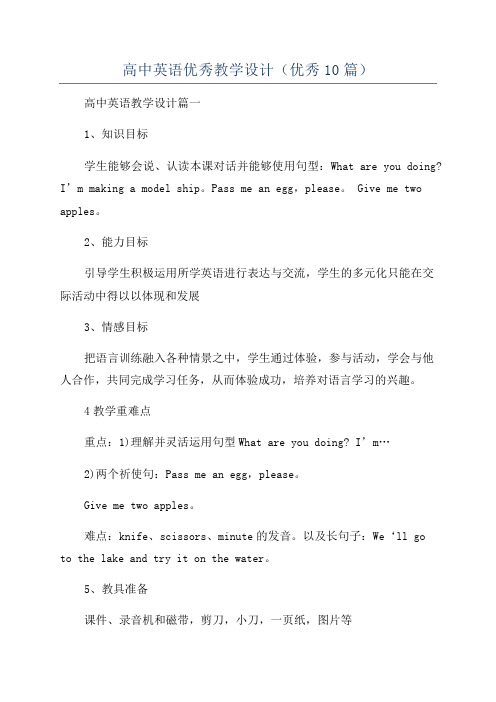
高中英语优秀教学设计(优秀10篇)高中英语教学设计篇一1、知识目标学生能够会说、认读本课对话并能够使用句型:What are you doing? I’m making a model ship。
Pass me an egg,please。
Give me two apples。
2、能力目标引导学生积极运用所学英语进行表达与交流,学生的多元化只能在交际活动中得以以体现和发展3、情感目标把语言训练融入各种情景之中,学生通过体验,参与活动,学会与他人合作,共同完成学习任务,从而体验成功,培养对语言学习的兴趣。
4教学重难点重点:1)理解并灵活运用句型What are you doing? I’m…2)两个祈使句:Pass me an egg,please。
Give me two apples。
难点:knife、scissors、minute的发音。
以及长句子:We‘ll goto the lake and try it on the water。
5、教具准备课件、录音机和磁带,剪刀,小刀,一页纸,图片等方案设计方法基于本课的特点和六年级学生好动,好奇,模仿力强,表现欲旺盛等心理特点,我在教法设想和学法指导上坚持以情景话题为核心,以功能、结构为主线,以任务型活动贯穿教学始终,运用直观教学法,情景教学法,全身反应法等教学方法,帮助学生在视听说读唱玩演等饶有趣味活动中,相互合作,体验参与,自主的、愉快的学习英语,发展能力,维持兴趣。
力求做到:“开课能激趣,讲课蕴情趣,练习有兴趣,结束藏意趣”教案流程1、 Warm up(1) Greetings师生相互问候,帮助学生自然进入英语学习状态(2) Sing a song and dance: Front,back,right ,left师生共同唱歌跳舞,既活跃课堂氛围,拉进师生间距离。
2、 Revision让学生两人一组复习第18课的会话,为下一步学习作了铺垫。
高中英语优秀教学设计5篇
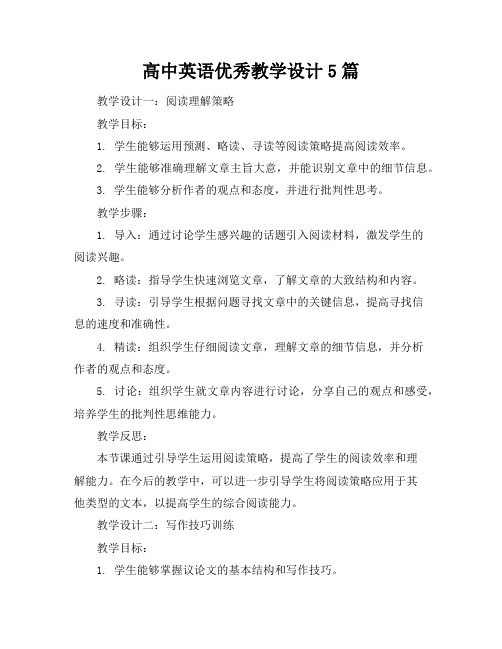
高中英语优秀教学设计5篇教学设计一:阅读理解策略教学目标:1. 学生能够运用预测、略读、寻读等阅读策略提高阅读效率。
2. 学生能够准确理解文章主旨大意,并能识别文章中的细节信息。
3. 学生能够分析作者的观点和态度,并进行批判性思考。
教学步骤:1. 导入:通过讨论学生感兴趣的话题引入阅读材料,激发学生的阅读兴趣。
2. 略读:指导学生快速浏览文章,了解文章的大致结构和内容。
3. 寻读:引导学生根据问题寻找文章中的关键信息,提高寻找信息的速度和准确性。
4. 精读:组织学生仔细阅读文章,理解文章的细节信息,并分析作者的观点和态度。
5. 讨论:组织学生就文章内容进行讨论,分享自己的观点和感受,培养学生的批判性思维能力。
教学反思:本节课通过引导学生运用阅读策略,提高了学生的阅读效率和理解能力。
在今后的教学中,可以进一步引导学生将阅读策略应用于其他类型的文本,以提高学生的综合阅读能力。
教学设计二:写作技巧训练教学目标:1. 学生能够掌握议论文的基本结构和写作技巧。
2. 学生能够运用论据和论点进行有效的论证。
3. 学生能够进行自我修改和同伴互评,提高写作水平。
教学步骤:1. 导入:通过分析优秀议论文,引导学生了解议论文的基本结构和写作技巧。
2. 写作指导:讲解议论文的写作步骤,包括确定论点、寻找论据、组织文章结构等。
3. 实践练习:组织学生进行写作练习,并鼓励学生运用所学技巧进行创作。
4. 同伴互评:引导学生进行同伴互评,互相提出修改建议,提高写作水平。
5. 自我修改:指导学生根据同伴互评和自我反思进行修改,完善文章。
6. 展示与分享:组织学生展示自己的作品,并分享写作心得和体会。
教学反思:本节课通过讲解写作技巧和实践练习,提高了学生的写作能力。
在今后的教学中,可以进一步引导学生关注写作过程中的细节问题,如语法、拼写、标点等,以提高学生的写作质量。
教学设计三:口语交际能力提升教学目标:1. 学生能够运用恰当的口语表达技巧进行日常交流。
高中教案详案范文英语精选10篇
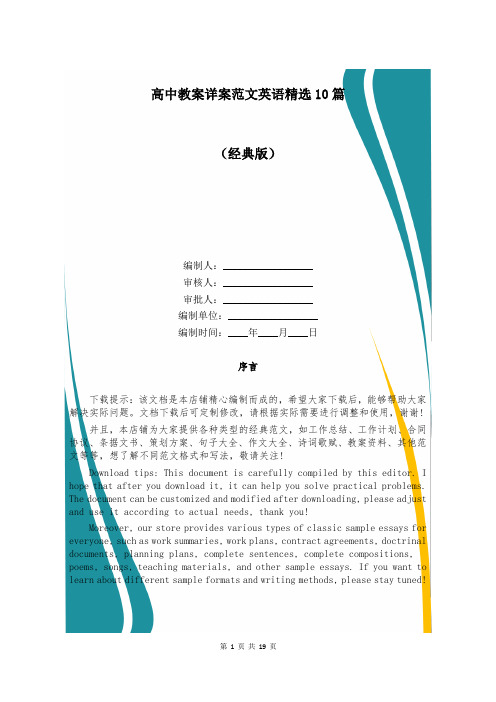
高中教案详案范文英语精选10篇(经典版)编制人:__________________审核人:__________________审批人:__________________编制单位:__________________编制时间:____年____月____日序言下载提示:该文档是本店铺精心编制而成的,希望大家下载后,能够帮助大家解决实际问题。
文档下载后可定制修改,请根据实际需要进行调整和使用,谢谢!并且,本店铺为大家提供各种类型的经典范文,如工作总结、工作计划、合同协议、条据文书、策划方案、句子大全、作文大全、诗词歌赋、教案资料、其他范文等等,想了解不同范文格式和写法,敬请关注!Download tips: This document is carefully compiled by this editor. I hope that after you download it, it can help you solve practical problems. The document can be customized and modified after downloading, please adjust and use it according to actual needs, thank you!Moreover, our store provides various types of classic sample essays for everyone, such as work summaries, work plans, contract agreements, doctrinal documents, planning plans, complete sentences, complete compositions, poems, songs, teaching materials, and other sample essays. If you want to learn about different sample formats and writing methods, please stay tuned!高中教案详案范文英语精选10篇高中教案详案范文英语第一篇I know most of my high school fantasy of XXXcontentXXX is not possible, otherwise it is not called XXXfantasyXXX.Things are always conflict with I XXXthinkXXX, might be gods his old mans house dont let me get it.High school I even very hard tsinghua Beijing university,more dont say XXXones deceased father grindXXX later; The college entrance eXamination after I went to the jiangnan tourism, looking forward to meet in a misty rain.But didnt in this picturesque jiangnan met that my mind think that XXXwomanXXX; Im looking forward to start a company also dont know whether can realize, everything is unknown...高中教案详案范文英语第二篇1.题目:MillenniumKids2.内容Millennium Kids is an international youth empowerment environmental organization.Millennium Kids HQ - Perth Western Australia is a not-for-profit organization headquartered in Perth, Western Australia,began in 1996 after a small group of Western Australian students attended the United Nations ‘Leave It ToUs’ environmental conference for children in the UK.On their return from the conference, the young people were disappointed with the level of youth involvement in local environment issues and decided to set the wheels in motion for developing their own environmental conference –“Kids Helping Kids.With support from Perth Zoo, Department of Environment, Clean Up Australia, CALM and the City of South Perth a conference was born and, subsequently, their own youth-based environmental organization, Millennium Kids Inc.The organization has international affiliates in Canada and South Africa with collaborative organization links in Indonesia and Malaysia.Millennium Kids Australia is a registered charity with taX deductible lennium Kids is run by kids, for kids,aged 10–25 years.A team of educators, mentors and sponsors support their aim to encourage young people to be leaders by being aware and active in their environment.Young people aged 18–25 can progress to leadership and training roles within the organization helping take practical action to improve their local environment.The Millennium Kids agenda is directed by its Youth Board,with fifteen members aged between 10 and 25 years, and issupported by the United Nations Environment Program Agenda 21,Chapter 25 Declaration which states ‘national governments should pay more attention to the opinions and concerns of children regarding the environment’ and how it should be managed for future generations’.3.要求(1)朗读短文(2)设计听力课(3)适当板书设计高中教案详案范文英语第三篇高中英语阅读课文具有题材广泛、体裁各样、语言知识丰富等特征,是各单元教学的核心部分,也是培养学生阅读能力的主要渠道。
高中英语教案(优秀6篇)-最新

高中英语教案(优秀6篇)在本单元教学中,学生学习并初步掌握非限制性定语从句的用法,并运用到书面作业中。
进一步学习提出建议的表达方式,能较为熟练的提出建议,语言使用正确。
一起看看人教版高一英语必修二全册教案!欢迎查阅!的精心为您带来了6篇《高中英语教案》,亲的肯定与分享是对我们最大的鼓励。
高中英语教案篇一学习目标Students are to be able topredict what to hear.use the group of words related to stress.tell the ways to deal with the stress.教学流程学生背景升入高中后的'第二节英语课。
教学内容1) Listen to an interview concerning stressful situations2) Predict before listening教学目的1) To identify stressful situations.2) To use stress related words and expressions.3) To learn about ways of dealing with stress.4) To predict before listening.教学过程步骤教师活动学生活动时间教具板书可能遇到的问题Lead inAsk questionsWrite down key words on the Bb Answer the questionsGet familiar with the topic 2’ PicturesComputer TitleNew words and key sentences Ss might not use the target wordsIntroduceLexicalItems inContextWrite down model sentences on the Bb Brainstorm and talk about stressful situations 3’Textbook Model sentences Differences betweenvery, quite vs.a littleCheck point Ex. 2 Page 10 Focus on the form, meaning and use of the lexical items 3’Textbook Key words Ss might have difficulty producing the answer:stress pressurePrediction Introduce the technique of prediction Ss use the technique to predict answers individuallyJustify their opinions in pairs 5’ Textbookputer No Ss’ individual differencesListeningPlay the cassetteHighlight the strategiesPlay the cassettetwice Listen for general information to check the answers 10’ ComputerTextbook No Some Ss might feel depressed after checking, then they need encouragement Listening Play the cassette for the third timeEncourage Ss to choose suitable ways to answer the 3 questions based on their abilityHelp Ss to find the right answers Listen for specific information to answer the questionGet enough information on stress and learn the ways to deal with stress 12’TextbookAnswer sheetComputer NoSs might over or under- estimate their own ability to answer the questionsSs might not be able to collect enough specific information to finish the taskGive Suggestions Offer a chance for Ss to evaluate their study Solve practical problems in their life in groupsPresentationEvaluation 10’ Answer sheets Evaluation formThe suggestions might be quite different based on individual differences, whatever the results everyone should be awardedHomework Read Supplementary Reading on P7 P9高中英语教案精选篇二Revision1. Ask students some questions to revise the last lesson(show them on the screen).a. How much salt do the oceans contain per thousand parts of water?(35 parts of salt. 3.5% by weight)b. What is coral? Why are corals not found in deep water?c. Why is the Dead Sea called the Dead Sea?2. Check the homework(made a survey about the sea or sea life by surfing the Internet or asking for help from other people). Through this part we can consolidate what they studied yesterday, municate with others about their survery results and prepare for the new lesson.高中英语教案范文Step 3Lead-in and preparation for readingShow them some pictures and let them talk each other, and then use the pictures about sea and life in the oceans to learn new words, for example, Antarctica, huge whale, sperm whale, squid and so on.Purpose: Arouse the students’ interest of study.Bring in new subject: Life in the oceans.高中英语教案篇三(1)课题:Friendship(2)教材分析与学生分析:本单元的中心话题是“友谊”,几乎所有的内容都是围绕这一中心话题展开的。
高中英语教案模板(15篇)

高中英语教案模板(15篇)高中英语教案模板(精选篇2)高中英语教案模板(精选篇7)高中英语教案模板(精选篇8)教学预备教学目标1、把握下列词汇和短语: reason, list, share, feelings, Netherlands, German, outdoors,Crazy, nature, dare, thundering, entirely, power, trust, indoors, go through,hide away, set down, a series of, on purpose, in order to, face to face,according to.2、进一步学习有关“伴侣”的学问信息,启发同学对伴侣和友情的思索。
3、了解《安妮日记》的背景学问,在感受外国文化的同时,深刻理解安妮日记的内涵,同时提高同学文化意识。
4、训练同学肯定的阅读技巧,使他们把握一些有效的学习策略,从而提高阅读速度和理解的精确性,并养成肯定的自主学习力量。
5、培育同学快速阅读的力量、捕获信息的力量及运用语言进行交际的力量。
6、通过个人活动、小组活动和班级活动等方法,培育同学的合作互助精神,共享英语学习的阅历,感受用英语沟通的胜利和喜悦。
教学重难点教学重点:1、了解《安妮日记》的背景学问,在感受外国文化的同时,深刻理解安妮日记的内涵,同时提高同学文化意识。
2、训练同学的阅读技巧,提高同学阅读速度和理解力量。
教学难点:对所获得的信息进行处理、加工和学习,形成有效的学习策略。
教学工具ppt课件教学过程...板书Uint1 Reading Anne’s Best FriendQualities: easy-going ,warm-hearted ,helpful,… Questions:SkimmingSummarizeDiscussion: 1 style 2 ideas高中英语教案模板(精选篇9)教学目标To help students learn to express attitudes, agreement disagreementand certaintyTo help students learn to read the text and learnto write diaries inEnglishTo help students better understand “friendship”To help students learn to understand and use some important words andexpressionsTo help students identify examples of Direct Speech Indirect Speech(I): statements and questions in the text教学重难点Wordsupset, ignore, calm, concern, settle, suffer, recover, packExpressionsadd up, calm down, have got to, be concerned about,go through, set down, aseries of, on purpose, in order to, at dusk, face to facer, no longer/ not …anylonger, suffer from, get/ be tired of, pack (sth.) up, get alongwith, fall inlove, join inPatterns“I don’t want to set down a series of facts in a diary as most people do,”said Anne. →Anne said that she didn’t want to set down a series of facts in adiary as most people do.I stayed awake on purpose until half past eleven……it was the first time in a year and a half that I’d seen the night face toface…教学工具ppt教学过程Hello, everyone. I’m so glad to be your teacher of English. I’d like tomake friends with you, to build up a close friendship with you. Today we shalltake Unit 1. The topic of this unit is Friendship. What do you think friendshipis?1. Warming up⑴ Warming up by defining friendshipHello, everyone. I’m so glad to be your teacher of English. I’d like tomake friends with you, to build up a close friendship with you. Today we shalltake Unit1. The topic of this unit is Friendship. What do you think friendshipis?Yeah, there are many explanations about friendship. However, friendship isa relationship that can’t be restricted(限制)by definition(定义). It can only beexperienced. True friendship can exist between any two souls, be it betweenpeople or animals. It can happen at any moment, to anyone. Even to lifelessthings, like a diary, a ball, a friendship can happen.Then what is your opinion about friendship?Do you think that friendship is important to our life? Why?⑵Warming up by learning to solve problemsNice to meet you, class. We shall be friends from now on. For everybodyneeds friends. But being a good friend can sometimes be hard work. Learning howto solve problems in a friendship can make you a better friend and a happierperson. Discuss the situation below and try to solve the problems wisely.Common problems among teenagersSolutionSome of the common problems include forgettingfriends’ birthday, notkeeping promises, letting out friends’ secrets and so on.Maybe we can have a heart-to-heart talk with our friends to ask forforgiveness.Situation 1: Friends get angry with each other when they try to talk aboutsomething difficult.Try to understand your friend/ Try to talk about the problem in a differentway.Situation 2: Friends don’t know how to apologize Start by telling each other that you are sorry. A simple apology is oftenenough and is a good starting point.Situation 3: Some friends don’t know how to keep secrets.Keep your secrets to yourselfTips on being a good friendTreat your friends the way you want to be treated. Keep secrets that aretold to you.Pay attention when your friend is talking. Keep your promises. Share thingswith your friend. Tell your friend the truth. Stick up for your friend.⑶Warming up by doing a surveyGood morning, class. I am your teacher of English. Glad to be here withyou. Today we shall take Unit 1 Friendship.To be frankly, I’d like very much to keep a close friendship with you, mydear students, in the following years. How about you then? Ok, thanks. I do hopeto be your good teacher as well as your helpful friend (良师益友).Now please do the survey on page one.Add up your score according to the scoring sheet on page 8. You don’t haveto tell your results. You can just keep it a secret.高中英语教案模板(精选篇10)教学目标1. To practise listening comprehension.2.To practise making decisions and reasoning教学重难点1. To practise listening comprehension.2.To practise making decisions and reasoning教学工具课件教学过程Step1. revision1. check the homework exercises.1). It has been reported that children will be offered free education.It has been reported that free education will be offered to children.2). It has been said that we will be offered the latest computer science course book.It has been planned that the latest computer science course book will be offered to us.3). I have been told by Peter that I will be lent his notebook computer for a week.I have been told by Peter that his notebook computer will be lent to me for a week.2. Question: What can computers be used as?Step2. Lead-inAs we know, science and technology is developing very fast and computers have become smaller and smaller. They have been used in many fields. So, the 21st century is the century of information technology What does it mean? Does information technology/ IT only mean thingslike computers? Of cause not. Actually, it means more than computers. Computers are just one kind of IT. What else do you know is part of IT?(TV, radio, CD-ROM, DVD, books……)Step3. Listening (SB)1. Pre-listening: What are the changes brought by different forms of IT ?What are the advantages and disadvantages of them ?2. While-listening:Go through the chart and make sure the students look at the chart before they listen to the tape. (This is to sharpen their attention and listen for the answers. This will also help them get the gist of the text.) Then Listen to the tape and finish filling in the chart. (If necessary, play the tape for several times.)Say: After listening to their talk, we know all kinds of IT have both disadvantages and advantages.Let’s check the answers together.Type of IT Advantages DisadvantagesTV You can both listen and watch. You cannot write to friends.Web You can find information. It is very expensive.Radio You can listen to English. You cannot watch a film.Book You can get information. Sometimes it is out of date.3. Post-listening:1) (pair work): decide which type of IT is best for you to use right now. Make your choice and give your reasons by using the following expressions.I think that….In my opinion, ….I believe that….I agree because….I disagree because….I’ve decided that….2) (group work): Discussion :Computers are useful and have brought us lots of good things, but they also cause bad effects. What attitude should we have towards the computer? (Make good use of it but never get trapped by it.)Step4. Speaking1. Pre-speakingSay: From what we have learn, we should admit thatcomputers and the web have a great influence on the school education as well as people’s life. It has come into people’s everyday life and many families hold computers in their homes. Now there is a task for you.2. While-speaking1) Situation: You have been asked by your parents to help choose computers for your home. You and your friend have looked at several computers. Talk about the special things each computer can do. Make a decision about which kind of computer to buy and explain why. Information input: Show students some pictures of different computers (desktop computer laptop computer …)Language input: Useful expressions (Repeat it to strengthen students’ ability of use it.)Supporting an opinion Challenging an opinionI think that … , because … Perhaps, but what if / about …First, … Have you thought about …One reason is that … What makes you think that I think it is better because… I don’t like it because….(Pair work )Use the expressions to support your opinion or challenging other’s opinions.2) Oral report: (individual work )Do an oral report to your father and start your report like this: I looked at many different computers. The one I have chosen is the PEP personal computer. One of the main reasons is that it is suitable for homes.I found that…3. Post-speakingConclusion—What useful expression do we use to make a decision and reason?(In this way, they can review and use the words and phrases again.)Step6 Pre-writingSay: Imagine what problems and delights this android might have to deal with while it is serving you. Try yourself in someone else’s shoes is an important way of understanding how other people feel.Then discuss: You are an android. You work for a family with one child who is very spoiled. The parents want you to do everything for them. The parents are nice, but they often ask you to watch over their child. Howdo you feel? What would you do if the child asked you to do his/her homework for him/her? Would you ever tell the child “no”?Step7 WritingSay: Write a passage about the result of your discussion! It should contain:What do you have to do?What is the child like?What is the parents’ requirement of the child? What do the parents want you to do?What does the child want you to do?Then what will you do? How do you feel?Sample writing:Hello everybody, my name is Liu Yan.I am a 321 model android.I work for the Li family. Mr and Mrs Li work very hard too.Mr Li is an architect and designs great tall apartment blocks.Mrs Li is a doctor and has to look after many patients.I remember all the plans for Mr Lis projects and can tell Mrs Li which drugs are the best to give any particular patient. And I also look after their library. I store all the books that they borrow from their school or friends in my brain.Of course mybrain is as large as a mountain, so work like that is no trouble to me.I really eat books just like people eat food.The Lis have a child who is very spoiled. He needs me to remember all his school textbooks so that I can do his homework for him.He just gives me the information on the subject, what has to be done and the page numbers and I get on with it while he enjoys himself with his friends.Sometimes I dont think it is right to do his homework for him — its somewhat cheating. However, his parents are very concerned at the pressure of work in school these days.The child has too much homework to do. They like him to go to the key school but they also want him to be able to have hobbies, learn to swim and keep fit! Poor child!So they consider me the most important person in the family after themselves.I am always introduced to their friends and play with visiting children.I am the perfect family academic aid and, although I was not cheap to buy, Mr Li says I was worth every yuan!Step8 AssessmentGet the students to assess their writing abilityaccording to the following the questions:1. Is your composition well developed?2. Are your ideas well organized to the point?3. Do you have a good choice of words and idioms in your writing?4. Do you get a good mastery of complex structures of language?5. What kind of mistakes have you made in your writing?Step9: HomeworkWrite about your discussion. You may begin like this:Hello, everyone. My name is __X. I’m 321 model android. I work for the Li family….课后小结学了这节课,你有什么收获?课后习题完成课后习题一、二。
高中英语教案(优秀8篇)

高中英语教案(优秀8篇)高中英语教学设计篇一单元整体设计思路第一课时:阅读课Warming up; Pre-reading; Reading; Comprehending (pp. 1-2)第二课时:语法课Discovering useful structures (p. 4); Using structures (p. 43)第三课时:阅读与听说课Reading and listening; Speaking (pp. 5-6)第四课时:词汇课Discovering useful words and expressions (p. 3); Using words and expressions (p. 42)第五课时:听说课Listening; Talking (p. 41)第六课时:读写课Reading and writing (p. 7)第七课时:单元评价课Self-test and self-evaluation; Summary第一课时阅读课一、教学内容Warming up; Pre-reading; Reading; Comprehending (pp. 1-2)二、教学目标在本节课结束时,学生能够了解文化遗产的基本概念、本质特点以及基本类型。
通过找读(scanning)关键词、略读(skimming) 和精读(careful reading),了解有关琥珀屋的故事。
用归类法学习词汇。
用自己的话复述琥珀屋的故事。
运用本课时学习的内容和自己已有的知识讨论相关话题。
三、教学步骤步骤一热身1.请学生看学生用书p. 1或者PPT中的图片,两人一组讨论三个问题。
教师请几组学生回答问题,然后综合大家的看法总结出文化遗产的定义。
2. 请学生说出一些中外文化遗产的名称,教师写在黑板上。
可以采取小组竞赛的形式,比一比看哪组说得多、说得正确。
注:问题中出现了五个生词。
rare, valuable和survive很难根据上下文猜出词义,教师可以布置学生课前查字典自学其词义,用法可以留到词汇课处理。
高中英语教案英文4篇
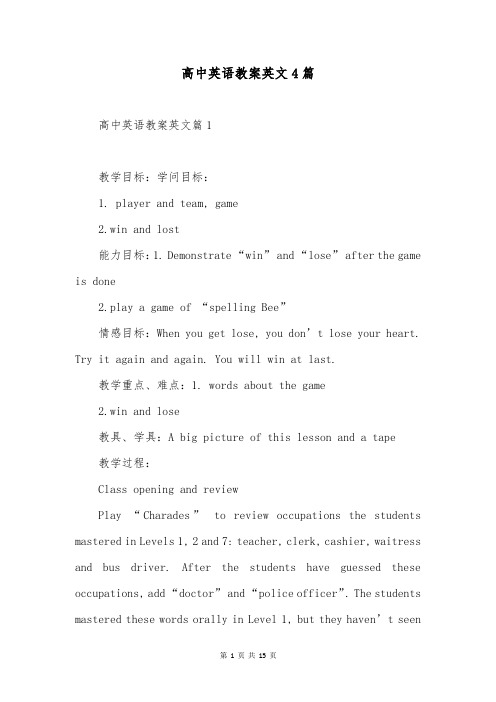
高中英语教案英文4篇高中英语教案英文篇1教学目标:学问目标:1. player and team, game2.win and lost能力目标:1. Demonstrate “win” and “lose” after the game is done2.play a game of “spelling Bee”情感目标:When you get lose, you don’t lose your heart. Try it again and again. You will win at last.教学重点、难点:1. words about the game2.win and lose教具、学具:A big picture of this lesson and a tape教学过程:Class opening and reviewPlay “Charades”to review occupations the students mastered in Levels 1, 2 and 7: teacher, clerk, cashier, waitress and bus driver. After the students have guessed these occupations, add “doctor” and “police officer”. The students mastered these words orally in Level 1, but they haven’t seenthem for a long time. Whisper the translation for these occupations to the students acting them out, and help the class guess the occupations with lots of prompts and encouragement. You can, for example, draw blanks on the blackboard and slowly write in the letters as you soundout more and more of each occupation.IntroduceDemonstrate “player”“team”“game” with six volunteers and a game of “spelling bee” divide the volunteers into two teams of three. Give player a sheet of coloured paper to hold, the same colour for each team.Demonstrate “win” and “lose” after the game is done. Point to the teams and as you say “You win/lose”Use the student bookPause after Number 1 in the student book.Review the story so far. Li Ming and Jenny have been learning about sports. Look at the pictures in the student book. What are they doing now?Note some of the idiom in this lesson: Bob plays basketball “for fun” Jenny and Li Ming “jump up and down” Li Ming asks Jenny “What’s the score?” What do the students think these phrases mean?PracticeDivide the class into small groups. In each group. Some students pretend that they want to learn a game that the other students know how to learn a game that you play in class.Do the activity bookClass closing高中英语教案英文篇2教学目标学问与技能(1)熟练把握下列词汇:rules, arrive, late, hall, dinning hall, listen, , fight, sorry outside,wear, important, bring, uniform, quiet(2)熟练把握下列短语:dining hall, arrive late for school, (be) on time, listen to music break the rules, in class, be/ keep quiet, a lot of, bring …to…,wear a hat, have to, music players(3)把握下列句型:1. Dont eat in class.2. You must be on time.3. Eat in the dining hall.4. 正确使用情态动词can, can’t——Can we wear a hat in school?——Yes, we can./No, we can’t.5. 能正确使用have to 和 must 谈论规章制度We must be on time/ We also have to be quiet in the library.教学重难点重点:1) 确定祈使句是省略掉主语的原形动词开头;2) 否定祈使句则是在确定祈使句前加上“don’t”。
高中英语优秀教学教案(通用5篇)
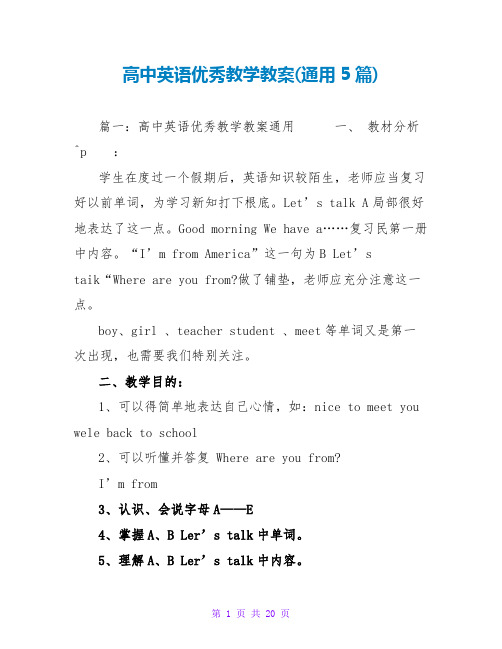
高中英语优秀教学教案(通用5篇)篇一:高中英语优秀教学教案通用一、教材分析^p :学生在度过一个假期后,英语知识较陌生,老师应当复习好以前单词,为学习新知打下根底。
Let’s talk A局部很好地表达了这一点。
Good morning We have a……复习民第一册中内容。
“I’m from America”这一句为B Let’staik“Where are you from?做了铺垫,老师应充分注意这一点。
boy、girl 、teacher student 、meet等单词又是第一次出现,也需要我们特别关注。
二、教学目的:1、可以得简单地表达自己心情,如:nice to meet you wele back to school2、可以听懂并答复 Where are you from?I’m from3、认识、会说字母A——E4、掌握A、B Ler’s talk中单词。
5、理解A、B Ler’s talk中内容。
三、教学重、难点:可以听懂并答复 Where are you from?掌握A、B Ler’s talk中单词。
理解A、B Ler’s tal k中内容。
四、课时安排第一课时 A lLet’s talk Let’s learn B Let’s sing第二课时 A Let’s practise Let’s play Let’schant第三课时 B lLet’s talk Let’s learn第四课时BLet’ssay Let’spractise第五课时 B Let’s Let’s第六课时 C story time篇二:高中英语优秀教学教案通用教学目的1、引导学生通过上下文理解生词的含义:anecdote, annual, witness, acmodation, shore, yell, pack, flee, drag, depth, lip, tongue, abandon, relationship, help out2、帮助学生掌握文中一些描绘事物和情景的生动手法,从而体会作者的思想情感,把握文章的精华。
英语教案高中教学范文5篇
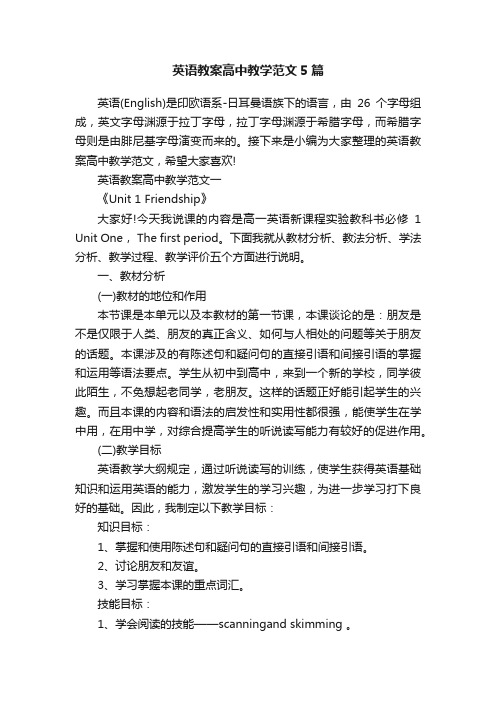
英语教案高中教学范文5篇英语(English)是印欧语系-日耳曼语族下的语言,由26个字母组成,英文字母渊源于拉丁字母,拉丁字母渊源于希腊字母,而希腊字母则是由腓尼基字母演变而来的。
接下来是小编为大家整理的英语教案高中教学范文,希望大家喜欢!英语教案高中教学范文一《Unit 1 Friendship》大家好!今天我说课的内容是高一英语新课程实验教科书必修1 Unit One, The first period。
下面我就从教材分析、教法分析、学法分析、教学过程、教学评价五个方面进行说明。
一、教材分析(一)教材的地位和作用本节课是本单元以及本教材的第一节课,本课谈论的是:朋友是不是仅限于人类、朋友的真正含义、如何与人相处的问题等关于朋友的话题。
本课涉及的有陈述句和疑问句的直接引语和间接引语的掌握和运用等语法要点。
学生从初中到高中,来到一个新的学校,同学彼此陌生,不免想起老同学,老朋友。
这样的话题正好能引起学生的兴趣。
而且本课的内容和语法的启发性和实用性都很强,能使学生在学中用,在用中学,对综合提高学生的听说读写能力有较好的促进作用。
(二)教学目标英语教学大纲规定,通过听说读写的训练,使学生获得英语基础知识和运用英语的能力,激发学生的学习兴趣,为进一步学习打下良好的基础。
因此,我制定以下教学目标:知识目标:1、掌握和使用陈述句和疑问句的直接引语和间接引语。
2、讨论朋友和友谊。
3、学习掌握本课的重点词汇。
技能目标:1、学会阅读的技能——scanningand skimming 。
2、通过谈论朋友和友谊,既锻炼学生的语言运用能力,又培养了学生发现问题、思考问题、解决问题的能力。
3、理解阅读文段,复述故事。
情感态度:1、患难之交才是真朋友。
2、知音难得。
3、海内存知己,天涯若比邻。
文化意识:认识德国纳粹党。
让学生了解那段德国法西斯残害犹太人的历史,使学生在感受外国历史文化的同时自然而然的习得语言。
(三)重点与难点重点:1、训练scanningand skimming等阅读技能。
高中英语优秀教案(优秀7篇)
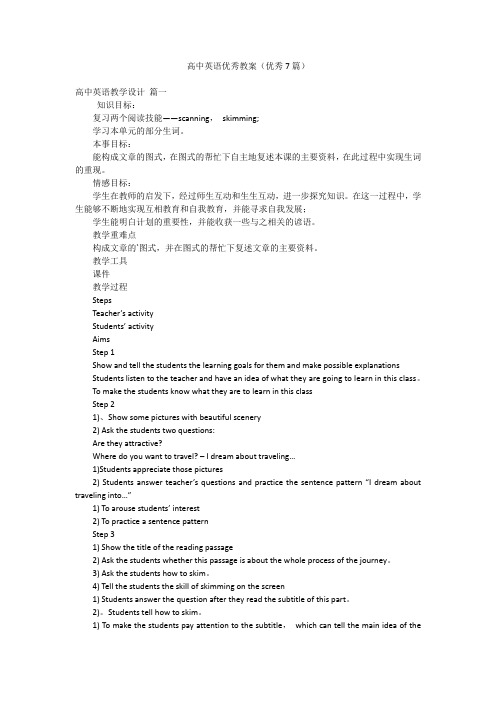
高中英语优秀教案(优秀7篇)高中英语教学设计篇一知识目标:复习两个阅读技能——scanning,skimming;学习本单元的部分生词。
本事目标:能构成文章的图式,在图式的帮忙下自主地复述本课的主要资料,在此过程中实现生词的重现。
情感目标:学生在教师的启发下,经过师生互动和生生互动,进一步探究知识。
在这一过程中,学生能够不断地实现互相教育和自我教育,并能寻求自我发展;学生能明白计划的重要性,并能收获一些与之相关的谚语。
教学重难点构成文章的`图式,并在图式的帮忙下复述文章的主要资料。
教学工具课件教学过程StepsTeacher’s activityStudents’ activityAimsStep 1Show and tell the students the learning goals for them and make possible explanationsStudents listen to the teacher and have an idea of what they are going to learn in this class。
To make the students know what they are to learn in this classStep 21)、Show some pictures with beautiful scenery2) Ask the students two questions:Are they attractive?Where do you want to travel? – I dream about traveling…1)Students appreciate those pictures2) Students answer teacher’s questions and practice the sentence pattern “I dream about traveling into…”1) To arouse students’ interest2) To practice a sentence patternStep 31) Show the title of the reading passage2) Ask the students whether this passage is about the whole process of the journey。
高中英语最新课程教案范文5篇
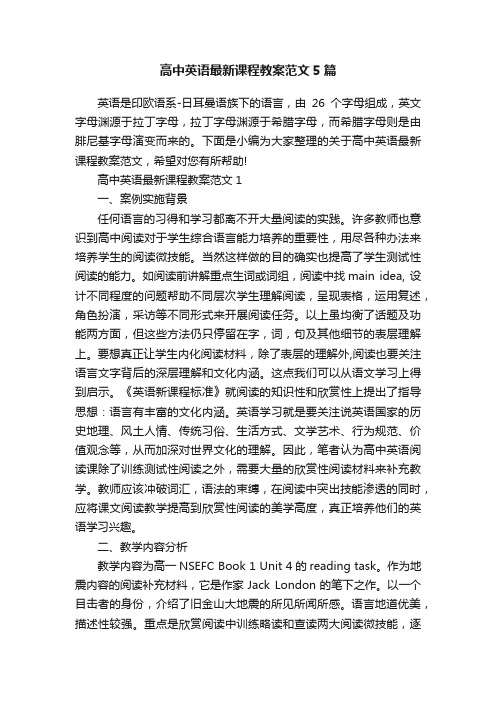
高中英语最新课程教案范文5篇英语是印欧语系-日耳曼语族下的语言,由26个字母组成,英文字母渊源于拉丁字母,拉丁字母渊源于希腊字母,而希腊字母则是由腓尼基字母演变而来的。
下面是小编为大家整理的关于高中英语最新课程教案范文,希望对您有所帮助!高中英语最新课程教案范文1一、案例实施背景任何语言的习得和学习都离不开大量阅读的实践。
许多教师也意识到高中阅读对于学生综合语言能力培养的重要性,用尽各种办法来培养学生的阅读微技能。
当然这样做的目的确实也提高了学生测试性阅读的能力。
如阅读前讲解重点生词或词组,阅读中找main idea, 设计不同程度的问题帮助不同层次学生理解阅读,呈现表格,运用复述,角色扮演,采访等不同形式来开展阅读任务。
以上虽均衡了话题及功能两方面,但这些方法仍只停留在字,词,句及其他细节的表层理解上。
要想真正让学生内化阅读材料,除了表层的理解外,阅读也要关注语言文字背后的深层理解和文化内涵。
这点我们可以从语文学习上得到启示。
《英语新课程标准》就阅读的知识性和欣赏性上提出了指导思想:语言有丰富的文化内涵。
英语学习就是要关注说英语国家的历史地理、风土人情、传统习俗、生活方式、文学艺术、行为规范、价值观念等,从而加深对世界文化的理解。
因此,笔者认为高中英语阅读课除了训练测试性阅读之外,需要大量的欣赏性阅读材料来补充教学。
教师应该冲破词汇,语法的束缚,在阅读中突出技能渗透的同时,应将课文阅读教学提高到欣赏性阅读的美学高度,真正培养他们的英语学习兴趣。
二、教学内容分析教学内容为高一NSEFC Book 1 Unit 4的reading task。
作为地震内容的阅读补充材料,它是作家Jack London的笔下之作。
以一个目击者的身份,介绍了旧金山大地震的所见所闻所感。
语言地道优美,描述性较强。
重点是欣赏阅读中训练略读和查读两大阅读微技能,逐步加深对旧金山地震及细节理解,并对地震中发生的一切形成自己的观点看法和情感态度,体会人们地震后表现出来的勇敢精神。
高中英语教案万能(通用8篇)
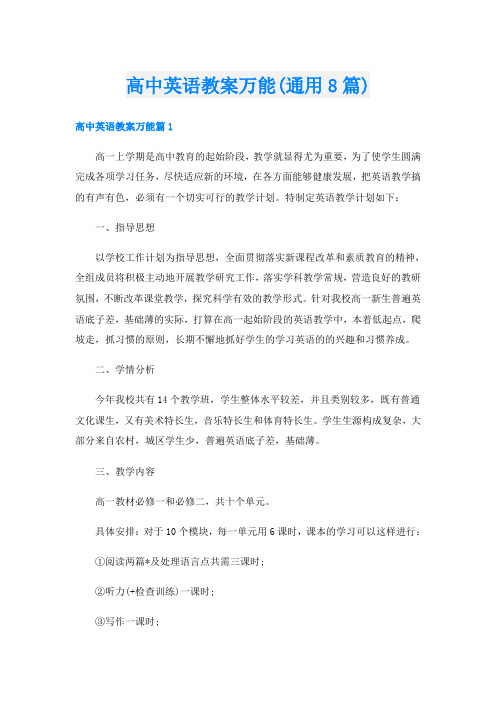
高中英语教案万能(通用8篇)高中英语教案万能篇1高一上学期是高中教育的起始阶段,教学就显得尤为重要,为了使学生圆满完成各项学习任务,尽快适应新的环境,在各方面能够健康发展,把英语教学搞的有声有色,必须有一个切实可行的教学计划。
特制定英语教学计划如下:一、指导思想以学校工作计划为指导思想,全面贯彻落实新课程改革和素质教育的精神,全组成员将积极主动地开展教学研究工作,落实学科教学常规,营造良好的教研氛围,不断改革课堂教学,探究科学有效的教学形式。
针对我校高一新生普遍英语底子差,基础薄的实际,打算在高一起始阶段的英语教学中,本着低起点,爬坡走,抓习惯的原则,长期不懈地抓好学生的学习英语的的兴趣和习惯养成。
二、学情分析今年我校共有14个教学班,学生整体水平较差,并且类别较多,既有普通文化课生,又有美术特长生,音乐特长生和体育特长生。
学生生源构成复杂,大部分来自农村,城区学生少,普遍英语底子差,基础薄。
三、教学内容高一教材必修一和必修二,共十个单元。
具体安排:对于10个模块,每一单元用6课时,课本的学习可以这样进行:①阅读两篇*及处理语言点共需三课时;②听力(+检查训练)一课时;③写作一课时;④单元检测一课时。
四、主要工作1、全面做好初高中衔接工作高中学段和初中学段在教学对象、教学内容、教学要求、教学方式和学习方式方面均存在着一定的差异。
因此,帮助高中学生了解这些差异,引导他们尽快适应高中的学习与生活,是摆在新学期高一教师面前的迫在眉睫的任务。
为了使学生打牢基础不至于出现知识断层,在开新课之前,拿出一周左右的时间搞好高初中之间的衔接,为开新课做好准备。
时间安排:一周左右课时安排:第一课时:音标。
目的是培养学生的拼读单词和自学单词的习惯和能力。
第二课时:词类与句子成分。
例句必须经典、简练、上口,以学生易于熟悉记忆与再现为准。
第三课时:语法线索:在整体梳理初中所学语法现象的基础上,以一段“自我介绍”涵盖初中主要的语法内容。
高中英语教案万能(精品6篇)
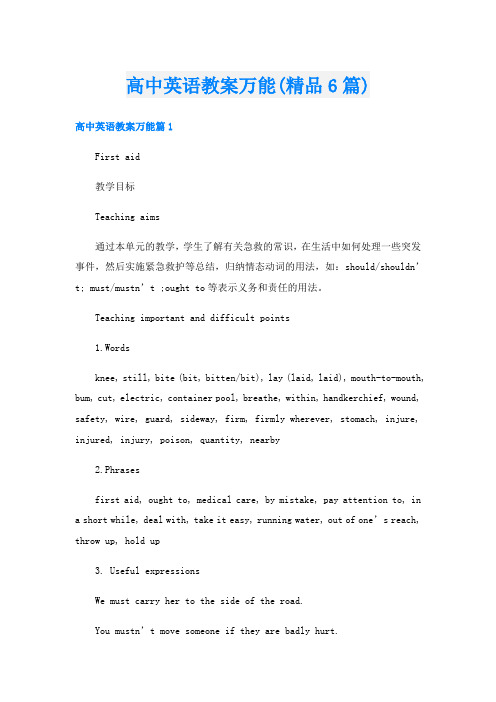
高中英语教案万能(精品6篇)高中英语教案万能篇1First aid教学目标Teaching aims通过本单元的教学,学生了解有关急救的常识,在生活中如何处理一些突发事件,然后实施紧急救护等总结,归纳情态动词的用法,如:should/shouldn’t; must/mustn’t ;ought to等表示义务和责任的用法。
Teaching important and difficult points1.Wordsknee, still, bite (bit, bitten/bit), lay (laid, laid), mouth-to-mouth, bum, cut, electric, container pool, breathe, within, handkerchief, wound, safety, wire, guard, sideway, firm, firmly wherever, stomach, injure, injured, injury, poison, quantity, nearby2.Phrasesfirst aid, ought to, medical care, by mistake, pay attention to, in a short while, deal with, take it easy, running water, out of one’s reach, throw up, hold up3. Useful expressionsWe must carry her to the side of the road.You mustn’t move someone if they are badly hurt.Parents should know some first aid.You shouldn’t get up if you are badly hurt.I ought to go home.I have to cook supper for my grandmother.4. GrammarRevise Modal Verbs : must, shouldStudy Modal Verb: ought to教学建议课文建议教师安排中国学习联盟声朗读课文,理解课文含义,通过阅读,教师对学生可小组讨论,提问,口语练习,复述急救方法等,教师给学生展示几组图片,帮助学生学会一般的急救措施和家庭安全常识。
- 1、下载文档前请自行甄别文档内容的完整性,平台不提供额外的编辑、内容补充、找答案等附加服务。
- 2、"仅部分预览"的文档,不可在线预览部分如存在完整性等问题,可反馈申请退款(可完整预览的文档不适用该条件!)。
- 3、如文档侵犯您的权益,请联系客服反馈,我们会尽快为您处理(人工客服工作时间:9:00-18:30)。
新年第一节英语课(高一教案)Step I Greetings and lead in(问候以及导入)1. Happy new year!T: Well, I am so happy to see you again after the long vacation. I wish everyone of you had a hap py holiday. So how about your holiday? Had you done some travel? 2. Learn some expressions ab out “dragon”(学习一些关于中国龙的习语、成语) T: This year is the year of dragon, so we will play a guessing game. I will show the English expressions and you try to guess the Chinese expressions, "long" included.Step II Revision(复习)1. Dear, how many words can you still remember after a month's winter holiday?2. 2. How many phrases can you still remember?3.3. Do you still remember the grammar very closely?There is no shortcut in the science road ,only be deligent.在科学上没有平坦的大道,只有不畏劳苦沿着陡峭山路攀登的人,才有希望达到光辉的顶点。
”(马克思)You never know what you can till you try.A good beginning is half done.中学英语全英文说课范文(模板)Unit 16 Lesson 63Hello, everyone. Today I’m very pleased to have an opportunity to talk about some of my teaching ideas. My topic is life in the oceans taken from Lesson 63 of Unit 16 in SEFC(2). It is made up of four parts.Part 1 My understanding of this lessonThe analysis of the teaching material:This lesson is a reading passage. It plays a very important part in the English teaching of this unit. Lesson 62 and Lesson 63 are a whole unit. By studying Lesson 63, Ss can improve their reading ability, learn more about the sea and the life in the oceans. At the same time, we should get the students to understand some difficult sentences to comprehend the passage better. The Ss should do some listening, speaking and writing, too. Of course, the Ss should receive some moral education. Let the Ss understand the sea better, love the sea and save the sea and the life of the sea. Teaching aims:1. Knowledge aim: Understand the main idea of the text.2. Ability aim: Retell the text in their own words.3. Emotional aim: Make the Ss love the life of the sea and do something to stop it being polluted. Key points / Teaching important points:How to understand the text better.Teaching difficult points:1. Use your own words to retell the text.2. Discuss the pollution of the sea and how to save the sea.Something about the Ss:1. The Ss have known something about the sea and sea life through the Internet and other ways.2. They are lack of vocabulary.3. They don’t often use English to express themselves and communicate with others.4. Some Ss are not active in the class because they are afraid of making mistakes.Part 2 My teaching theories, methods and aidsBefore dealing with this lesson, I’ll do my best to carry out the following theories: Make the Ss the real masters in class while the teacher himself acts as director;Combine the language structures with the language functions; Let the students receive some moral education while they are learning the English language.Teaching method:Double activities teaching methodQuestion-and-answer activity teaching methodWatch-and-listen activityFree discussion methodPair work or individual work methodTeaching aids:1. a projector2. a tape recorder3. multimedia4. the blackboardPart 3. Teaching steps / proceduresI have designed the following steps to train their ability of listening, speaking, reading and writing, especially reading ability.The entire steps are:Greetings, Revision, Lead-in and preparation for reading, Fast reading(scanning), Listening, Intensive reading, Preparation for details of the text, Consolidation, Discussion, HomeworkStep 1 GreetingsGreet the whole class as usual.Step 2. Revision1. Ask students some questions to revise the last lesson(show them on the screen).a. How much salt do the oceans contain per thousand parts of water?(35 parts of salt. 3.5% by weight)b. What is coral? Why are corals not found in deep water?c. Why is the Dead Sea called the Dead Sea?2. Check the homework(made a survey about the sea or sea life by surfing the Internet or asking for help from other people). Through this part we can consolidate what they studied yesterday, communicate with others about their survery results and prepare for the new lesson.Step 3. Lead-in and preparation for readingShow them some pictures and let them talk each other, and then use the pictures about sea and life in the oceans to learn new words, for example, Antarctica, huge whale, sperm whale, squid and so on.Purpose: Arouse the students’interest of study.Bring in new subject: Life in the oceans.Step 4. Fast readingRead the passage as quickly as they can. I show the questions on the screen and let them get themain idea of each paragraph:1. Why can living things live in such oceans around the Antarctica?2. What does the whale feed on?3. What is the difference between the sperm whale and other whales?Method: Read the text individually, use question—and—answer activity.Purpose: Improve the students’reading ability.Understand the general idea of each paragraph.Step 5. Listening(book closed)1. Listen to the tape then do an exercise(wb page 90, part 1)2. True or false exercise.(on the screen)Train the Ss’listening ability and prepare for later exercises.Step 6. Intensive readingRead the passage carefully again and answer some detailed questions on the screen.1. How much does a whale eat at a time?2. Do all the whales feed on small fish?3. How deep can a sperm whale dive?It is also called depth reading or study reading. It means reading for detailed information. Purpose: Further understand the text (Train further reading ability)to find out some different sentences and details of the text.Step 7. Preparation for details of the text on the screen1. ...its heart slows to half its normal speed.slow-v. to become / make slower.2. ing sound wavePresent participle used as adverbial.3. provide sth. for sb.provide sb. with sth.4. at a time: each time5. grow to a length of...Purpose: Train the Ss’ability of understanding and using laguage.Step 8. Consolidation1. Find out the topic sentences.2. Retell the passage according to the topic sentences.Purpose: I want to know if my students understand the whole text really and if they master what I mean to tell them in this class. What’s more, I want to let them have the ability of introducing and analyzing expression. At the same time, I will write down the topic sentences on the blackboard according to what the students find, so they can retell it easily.Step 9. DiscussionShow them some pictures about the polluted sea and many living things which are in danger and ask them: What are their opinions about it? In order to let them have free choice, I give them another topic: The sea is being polluted. What should they do?Purpose: I mean to give them emotional education. I give them multi-media pictures to arouse their interest of study and their love for life. I mean to make them realize: The sea is in danger!I teach them to do their best to help it and do something from now on. Everyone should do something to love and protect our home.Step 10. HomeworkWrite an article Saving the sea. I want to improve the ability of their writing. At the same time, train the ability of do-it-yourself and looking up the information by themseleves.Part 4. Blackboard designif / whether引导的宾语从句一、由if或whether引导的宾语从句。
